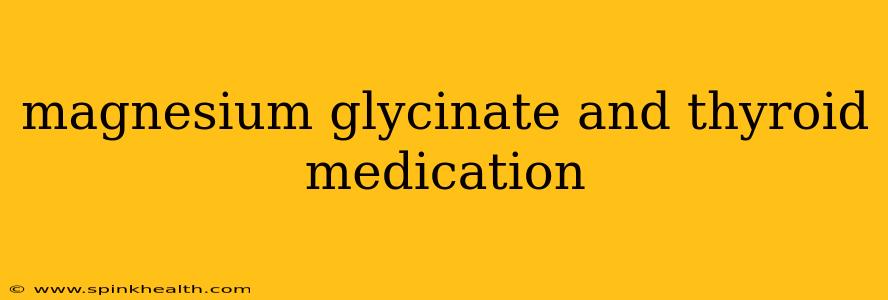The human body is a complex orchestra, and sometimes the instruments don't quite harmonize. This is especially true when considering the interplay between supplements, like magnesium glycinate, and medications, such as those used to treat thyroid conditions. Let's explore this fascinating interplay, separating fact from fiction and addressing common concerns.
My name is Dr. Evelyn Reed, and I've spent years researching the intricate relationship between nutrition and thyroid health. While I can't provide specific medical advice (always consult your doctor!), I can offer insights into the potential interactions between magnesium glycinate and thyroid medication.
What is Magnesium Glycinate?
Magnesium glycinate is a form of magnesium bound to the amino acid glycine. This chelation makes it easier for the body to absorb, leading to fewer digestive issues compared to other magnesium supplements. Magnesium plays a vital role in numerous bodily functions, including muscle contraction, nerve transmission, and blood sugar control. Its impact on the thyroid is a key area of ongoing research.
Can Magnesium Glycinate Affect Thyroid Medication?
This is the million-dollar question, isn't it? The short answer is: potentially, but it depends. There's no definitive, universally applicable answer. The interaction isn't a guaranteed negative event, but it warrants careful attention and monitoring. Here's why:
Both magnesium and thyroid hormones influence similar metabolic processes. For example, magnesium is involved in the production of thyroid hormones, and thyroid hormones influence magnesium metabolism. Therefore, a significant change in magnesium levels could theoretically influence how your body processes thyroid medication. However, this interaction isn't well documented in large-scale clinical trials.
How Could Magnesium Glycinate Interact with Thyroid Medication?
The potential interactions aren't always straightforward. It's not simply a case of magnesium "blocking" your medication. Instead, we're looking at more subtle effects:
- Absorption: Theoretically, high doses of magnesium might interfere with the absorption of certain thyroid medications, reducing their effectiveness. However, this isn't consistently observed.
- Metabolic Processes: Changes in magnesium levels could subtly affect the metabolic pathways involved in thyroid hormone production and utilization.
- Individual Differences: This is crucial. Responses to magnesium supplementation vary widely based on individual factors like genetics, diet, and overall health status.
Does Magnesium Glycinate Increase or Decrease Thyroid Hormones?
This is a frequently asked question, and the answer is nuanced. There isn't enough definitive research to say conclusively that magnesium glycinate increases or decreases thyroid hormones. Some preliminary studies suggest a potential link between magnesium levels and thyroid hormone production, but more robust research is needed.
Should I Take Magnesium Glycinate if I'm on Thyroid Medication?
This is a question only your doctor can answer. Open communication with your physician is key. Discuss your intention to take magnesium glycinate, including the dosage you're considering. They can assess your individual circumstances, review your medical history, and make an informed recommendation. Self-medicating can be dangerous, especially when dealing with thyroid conditions.
What are the Signs of Thyroid Medication Imbalance?
Monitoring for signs of thyroid imbalance is crucial, regardless of magnesium supplementation. These symptoms can vary, but common ones include:
- Weight changes: Unexplained weight gain or loss
- Fatigue: Persistent tiredness and lack of energy
- Changes in mood: Irritability, anxiety, or depression
- Heart palpitations: Irregular or rapid heartbeat
- Digestive issues: Constipation or diarrhea
- Changes in menstrual cycles: Irregular or absent periods
If you experience any of these symptoms, contact your doctor immediately. They can perform blood tests to check your thyroid hormone levels and adjust your medication as needed.
Conclusion:
The relationship between magnesium glycinate and thyroid medication is a subject of ongoing research. While potential interactions exist, they aren't guaranteed. The key takeaway is open communication with your healthcare provider. They can provide personalized advice based on your health status and medication regimen. Remember, proactive communication and regular monitoring are essential for optimal thyroid health. This information is for educational purposes only and should not be considered medical advice. Always consult your physician before making any changes to your diet or supplement regimen, especially if you are taking medication.

